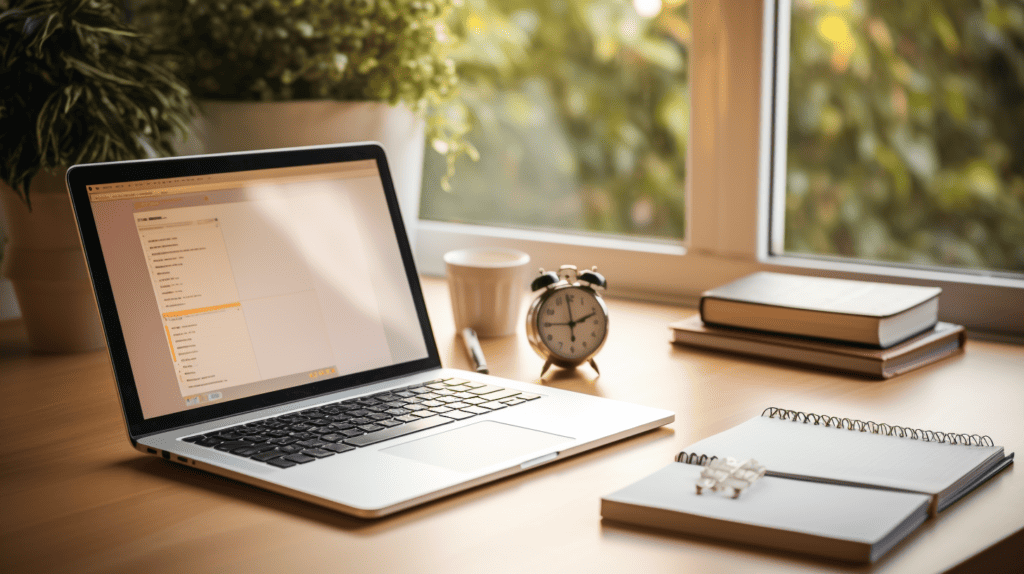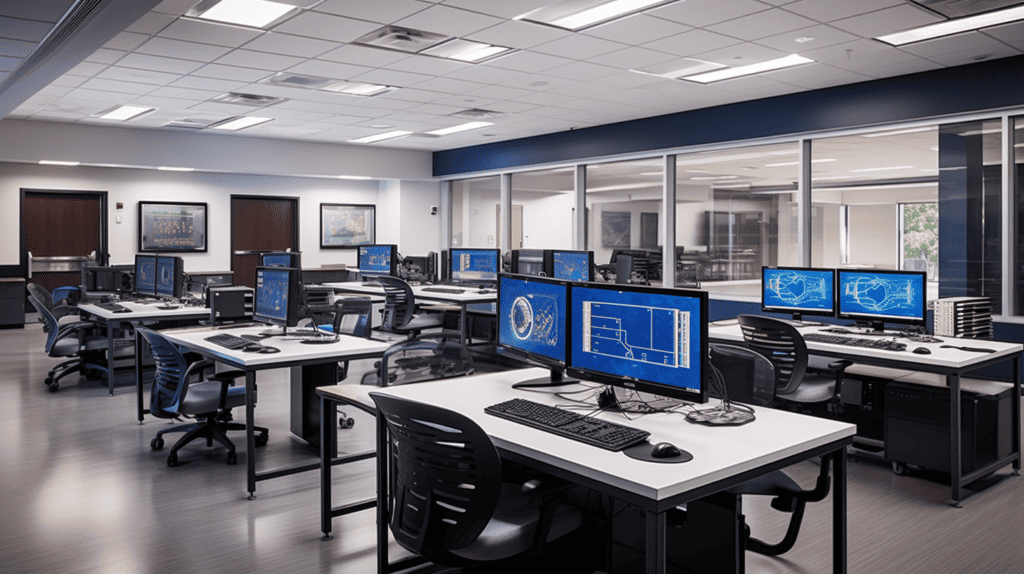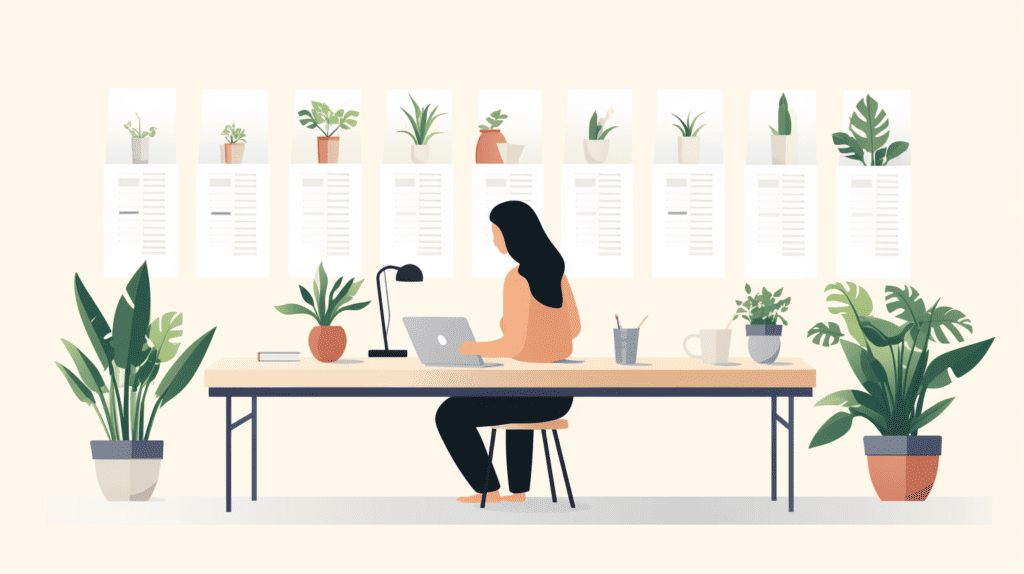As a professional, I know the value of effective time management. It’s critical to achieving your goals, growing your career, and staying ahead in today’s fast-paced world. Unfortunately, distractions can be a significant hurdle to managing your time effectively. Whether it’s a chatty coworker, a never-ending email inbox, or social media notifications, distractions can wreak havoc on your productivity if left unchecked. Today, we will look at distractions and time management!
That’s why in this article, we’re going to explore practical techniques to tame distractions and take control of your time. From understanding the impact of distractions on productivity to leveraging technology and creating a productive work environment, we’ll provide actionable tips to help you boost your productivity and accomplish your work goals.
Key Takeaways
- Effective time management is critical for professional success.
- Distractions can hinder productivity and time management skills.
- Practical techniques can help you overcome distractions and improve productivity, including mindfulness, digital detox, and goal setting.
Understanding the Impact of Distractions on Productivity
Welcome back! In this section, we’ll take a closer look at how distractions can impact your productivity and time management. While it may seem harmless to check your phone or browse social media during work hours, studies show that each distraction can cause up to a 25% loss in productivity.
There are two types of distractions: external and internal. External distractions come from outside sources, such as noise or interruptions, while internal distractions come from within, such as boredom or lack of motivation.
Common external distractions include email notifications, text messages, meetings, and co-workers. Internal distractions can include stress, anxiety, and fatigue. Identifying the specific distractions that affect you the most can help you develop strategies for managing them.
Reducing distractions can have a significant impact on your overall productivity. By minimizing interruptions, you can stay focused and complete tasks more efficiently. In the next section, we’ll explore specific techniques for overcoming distractions and improving your time management.
Time Management Techniques for Increased Productivity
Effective time management is essential for boosting productivity. To achieve this, it’s crucial to find ways to overcome distractions and stay focused. Here are some practical time management techniques that can help:
- Focus on the most important tasks first. Prioritizing your tasks can help you stay on track and avoid wasting time on less urgent tasks. List your tasks and tackle the most important ones first thing in the morning.
- Set specific, measurable goals. Setting goals can help you stay motivated and focused. Break down big goals into smaller, achievable ones that can be accomplished in a given day or week.
- Avoid procrastination. Procrastination is a common distraction that can severely impact productivity. Be mindful of your tendency to procrastinate and take steps to overcome it, such as breaking down tasks into smaller steps and setting deadlines for completion.
- Use a timer. Timing yourself can be a powerful tool for staying focused and avoiding distractions. Determine how much time you want to spend on a specific task and use a timer to keep you on track.

Overcoming Distractions
In addition to the above time management techniques, there are also helpful strategies for minimizing distractions:
- Eliminate or minimize interruptions. Interruptions can disrupt your flow and lead to wasted time. Turn off notifications, close unnecessary tabs, and communicate your need for uninterrupted time to colleagues and family.
- Take scheduled breaks. Taking short, scheduled breaks can actually improve productivity by helping you recharge and refocus. Use a timer to break up your work day into intervals, with breaks scheduled in between.
- Practice mindfulness. Mindfulness techniques such as meditation and deep breathing exercises can help you stay present and focused on the task at hand. Take a few minutes each day to practice mindfulness and use these techniques during breaks to calm your mind and reduce stress.
By implementing these time management and distraction-minimizing techniques, you can increase your productivity and achieve your goals more efficiently.
Enhancing Focus and Productivity through Mindfulness
As I mentioned earlier, distractions can significantly affect our productivity levels, especially in today’s fast-paced digital world. Mindfulness offers a way to manage distractions and stay focused, ultimately leading to increased productivity.
Meditation is one of the most popular mindfulness techniques, involving deep breathing exercises and mental visualization to promote calm and relaxation. Practicing meditation regularly can improve focus and concentration, making it easier to resist external distractions and work efficiently.
Deep Breathing Exercises
Deep breathing exercises are another effective technique for promoting mindfulness and reducing distractions. Taking a few deep breaths before beginning a task can help clear your mind and increase focus. Here’s a simple exercise you can try:
| Step | Description |
|---|---|
| 1 | Sit in a comfortable position, close your eyes, and take a deep breath in through your nose. |
| 2 | Hold your breath for a few seconds. |
| 3 | Slowly exhale through your mouth. |
| 4 | Repeat this process 5-10 times. |
Staying Present and Avoiding Multitasking
Another key aspect of mindfulness is staying present and avoiding multitasking. Multitasking may seem like an efficient way to get things done, but it can actually reduce productivity and increase the likelihood of errors. Instead, try focusing on one task at a time and give it your full attention.
Practicing mindfulness takes time and effort, but it can lead to significant improvements in productivity and overall well-being. Consider incorporating mindfulness techniques into your daily routine and see how it affects your focus and productivity levels.
Effective Strategies to Minimize Digital Distractions
As we rely more on technology in our daily lives, digital distractions can significantly hinder productivity and limit effective time management. Here are some effective strategies to minimize digital distractions:
Email Overload Management
It can be challenging to manage an overflowing inbox. To overcome this, I recommend creating a schedule for checking and responding to emails. Set aside specific times during the day to handle incoming messages instead of reacting to every notification. Additionally, use labels and filters to sort emails according to their priority.
Social Media Usage Limitation
Social media has become a ubiquitous presence in daily life. While it can be tempting to constantly check feeds, notifications, and messages, it can also be a significant distraction. To minimize this distraction, I suggest setting limits on social media usage. One way to achieve this is by using a browser extension that blocks access to social media sites during work hours or setting designated times for social media use during the day.
Smartphone Distraction Management
Smartphones have become an extension of our bodies and minds, often leading to constant distractions. To avoid this, I recommend disabling notifications for non-essential apps or assigning specific notification sounds to prioritize important ones. You can also use tools like Focus Mode on your phone or apps that track screen time to manage overall usage.
By minimizing digital distractions, you can significantly improve your focus, productivity, and time management skills. Implement these strategies to create a more productive work environment and achieve your goals more efficiently.

Setting Realistic Goals for Efficient Time Management
Setting goals is an essential component of effective time management. Without a clear sense of direction, it is easy to waste time and become distracted. However, it is equally important to be realistic and practical when setting goals to avoid disappointment or burnout.
One useful technique for setting realistic goals is to break down larger tasks into smaller, more manageable ones. Instead of tackling a project all at once, try to divide it into smaller steps that can be completed over time. This not only helps to keep you on track but also provides a sense of accomplishment with each completed step.
Another effective strategy is to create a schedule that prioritizes your tasks based on their level of importance and urgency. This can help you avoid wasting time on less important tasks while ensuring that critical tasks are completed on time. Remember to give yourself realistic timelines to avoid feeling overwhelmed or stressed.
Deadlines are also crucial for effective time management. However, it is important to set deadlines that are practical and achievable. Be honest with yourself about how much time you need to complete a task and set a deadline accordingly. Don’t be too hard on yourself if you miss a deadline, but be sure to learn from the experience and adjust your goals in the future.
Finally, accountability is another key aspect of setting and achieving realistic goals. Consider sharing your goals with a colleague or friend who can help you stay on track and provide support and encouragement.
Creating a Productive Work Environment
A cluttered and disorganized workspace can be a major distraction, hindering your ability to focus and be efficient. To create a more productive work environment, start by decluttering your workspace and organizing your materials. Keep only the items you use frequently within reach, and store the rest out of sight.
Invest in ergonomic office furniture, such as an adjustable chair and keyboard, to ensure you are comfortable and less prone to physical distractions. If possible, position your desk near a window or natural light source to increase your energy levels and improve your mood.
Consider using noise-cancelling headphones or a white noise machine to block out distracting sounds and create a sense of calm. If you work in a shared space, communicate with your colleagues about your need for a quiet environment and establish boundaries to minimize interruptions.

Leveraging Technology for Time Management
As a technology enthusiast, I always look for ways to incorporate it into my daily routine for maximum efficiency. With so many productivity tools available, it can be overwhelming to decide which ones to use. However, selecting the right ones can significantly improve your time management skills and reduce distractions.
One of my favorite apps is Trello, a project management tool that allows you to create boards, cards, and lists to organize tasks. It’s ideal for breaking down larger goals into smaller, actionable steps and tracking progress. The app also allows you to collaborate with others, making it perfect for team projects.
Another useful tool is RescueTime, which tracks your computer and phone usage to give you a detailed breakdown of how you spend your time. It helps identify time-wasting activities and allows you to set goals for more productive habits. The app also has a feature that blocks distracting websites, helping you stay focused during work hours.
If you’re someone who easily gets overwhelmed by emails, consider using Boomerang, an email management tool that allows you to schedule messages to be sent later, set reminders for follow-ups, and even pause your inbox to minimize distractions.
To reduce smartphone distractions, I recommend using the Forest app. It’s a gamified productivity tool that encourages you to stay focused by planting virtual trees. The longer you stay away from your phone, the more your forest grows. It’s a creative way to limit screen time and increase focus.
Effective Notifications Management
Notifications can be both helpful and distracting, depending on how you manage them. To avoid constant interruptions, it’s essential to customize your notification settings for each app on your phone and computer.
For example, you can turn off push notifications for social media apps or set them to only appear during specific times. You can also prioritize notifications for essential apps, such as your email or calendar, to ensure you never miss critical information.
If you use multiple devices, consider using a notification syncing tool like Pushbullet, which displays notifications from your phone on your computer. It saves time and minimizes distractions by allowing you to handle notifications on one device without having to switch back and forth.
Overall, leveraging technology can be a powerful way to improve time management, reduce distractions, and increase focus. However, it’s essential to use technology intentionally and not let it become a source of distraction itself.

Maintaining Consistency and Accountability
As I’ve discussed throughout this article, taming distractions and mastering time management are essential skills for anyone looking to increase productivity. But the key to effective time management is consistency and accountability.
It’s easy to fall off track and revert to bad habits, so it’s important to stay motivated and keep yourself accountable. Here are some strategies that I’ve found helpful:
- Write down your goals and deadlines: Putting your goals and deadlines in writing can help you stay accountable and on track. Create a schedule and stick to it as much as possible.
- Track your progress: Keep track of your progress on a regular basis. This will help you identify areas where you’re doing well, as well as areas that need improvement.
- Find an accountability partner: A friend or colleague who shares your goals can be a great source of motivation. Check in with each other regularly to stay on track.
- Be kind to yourself: Remember that no one is perfect, and it’s okay to make mistakes. Celebrate your successes and learn from your failures, and don’t let setbacks discourage you.
With consistent effort and accountability, you can develop the time management skills you need to boost your productivity and achieve your goals.
Conclusion on Distractions And Time Management
Mastering time management and reducing distractions can be a game-changer for boosting productivity. By implementing effective time management techniques and minimizing distractions, we can achieve better results and achieve our goals more efficiently.
Throughout this article, we’ve discussed various strategies for overcoming distractions, prioritizing tasks, creating a productive workspace, and leveraging technology to enhance time management skills.
It’s important to remember that time management is an ongoing journey and requires consistent effort and accountability. By staying focused and motivated, tracking progress, and adapting our routines as needed, we can continue to improve our time management skills and achieve greater productivity.
As I apply the lessons learned throughout this article, I am confident that I will be able to achieve my goals more efficiently and enjoy a more balanced work-life. I hope the same for you!
FAQ on Distractions And Time Management
Q: How can I overcome distractions to boost productivity?
A: Taming distractions is crucial for effective time management. You can minimize distractions by creating a dedicated workspace, setting boundaries, and utilizing time management techniques.
Q: What impact do distractions have on productivity?
A: Distractions can significantly hinder productivity. They can result in loss of focus, decreased efficiency, and increased time spent on tasks. It is important to identify and mitigate distractions to optimize productivity.
Q: What are some time management techniques to overcome distractions?
A: Some effective time management techniques include prioritizing tasks, setting goals, breaking down tasks into smaller steps, and avoiding procrastination. These techniques can help you stay focused and make the most of your time.
Q: How can mindfulness enhance focus and productivity?
A: Mindfulness techniques like meditation and deep breathing exercises can help you stay present and maintain concentration. Practicing mindfulness can reduce the impact of distractions and improve focus and productivity.
Q: What strategies can I use to minimize digital distractions?
A: To minimize digital distractions, you can manage email overload by setting specific times to check and respond to emails, limit social media usage during work hours, and use tools to block or manage smartphone distractions. Creating a focused work environment is essential.
Q: Why is setting realistic goals important for efficient time management?
A: Setting realistic goals allows you to prioritize tasks, create schedules, and manage deadlines effectively. It enables you to allocate your time and resources efficiently, leading to improved time management and productivity.
Q: How can I create a productive work environment?
A: You can create a productive work environment by decluttering and organizing your physical workspace, minimizing distractions, and optimizing lighting and ergonomics. A clean and organized workspace promotes focus and productivity.
Q: How can technology help with time management and reducing distractions?
A: Technology can be used as a tool to improve time management. Productivity apps, time-tracking tools, and techniques like managing notifications effectively can help you stay organized, track your progress, and reduce distractions.
Q: Why is consistency and accountability important in time management?
A: Consistency and accountability are essential for effective time management. By staying consistent with your routines, tracking your progress, and holding yourself accountable, you can stay motivated and continuously improve your productivity.





Leave a Reply